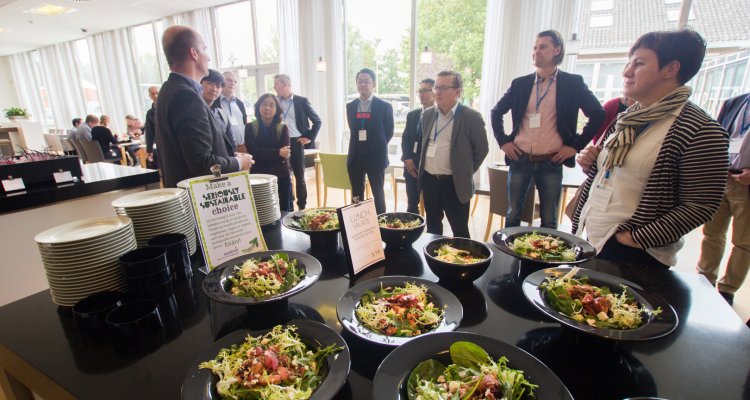Wageningen University & Research: Fresh, Regional, and Seasonal Products Now Available at WUR Restaurants
A fresh product of the season and from the region. Not only very tasty but also something that WUR and many staff and students find important. Fortunately, the restaurants on campus offer many of these products. How are the different caterers organising this and what is involved?
Oregional is a well-known wholesaler of fresh local products. More than 2,500 fresh regional products go from the grower and the farmer, via Oregional, directly to the caterers of WUR’s restaurants. For example, Wilma Vogelsang-Huisman of OSP (caterer of Impulse) says: ‘We buy our fruit and vegetables from Oregional every week. Every week we ask them what is a good seasonal product at that moment.’ Caterer Compass Group is also keen to make use of this regional supplier, says Patrick Cox, Compass Group branch manager on the Wageningen Campus. ‘For example, for our restaurants on campus, we get fresh products directly from farmers, growers and producers in the region. Think of Betuwe fruit, products from farms with a focus on nature management and animal welfare, loaves of bread with local grains and much more. Only if Oregional can’t source it in the region, do we look further in the Netherlands. Only a few products are sourced from further afield, such as bananas.
Compass Group is fully committed to cooperating with local entrepreneurs. For instance, Compass sees an opportunity to collaborate with care farm de Hoge Born. Account & Hospitality Manager Maj Mulder of Compass Group says: ‘We applied for the Hoge Born’s assortment list. This allows us to cook with seasonal produce from the immediate vicinity of the campus’.
Another regional cooperation of Compass is with Trash’ure taarten, a sustainable and social baker from Nijmegen. They make vegan cakes from seasonal ingredients that would otherwise be thrown away. Trash’ure taarten’ pastries are available via Compass’ new banqueting directory.
In this way, the caterers ensure that there are plenty of regional and seasonal products at WUR every day.
Spring = asparagus
The various caterers then each use these regional products in their own way. Hutten, caterer at Omnia, says through Jacco de Waal that every four weeks they put a different seasonal product at the heart of the menus. ‘In the summer we have the week of the bean, in the autumn the week of the pumpkin and in the winter the week of kale. And now, in spring, the week of asparagus. Recently, in collaboration with a taste researcher from WUR, we even held a special, interactive asparagus lunch. In addition, this expert – Dr Eirini Pegiou, a researcher in Post-Harvest Technology and Flavour Technology at WUR – explained the flavours and smells of asparagus.’ Hutten chef Doelan likes to use these seasonal products. ‘Because they are the best, most beautiful and tastiest products for that moment. At their peak in terms of taste and you can taste this on your plate.’
Red fruit and samphire
Like Hutten, Compass Group works with a fixed cycle. ‘In our restaurants, we work with the menu planner,’ says Patrick. ‘This means that the team has a choice of 1,400 recipes that are updated every four weeks. As a result, we can guarantee a seasonal supply. We are currently thinking about how we can show our guests at a glance in the restaurants and coffee bars, for example, which products come from the region.’ Michel van Vlaanderen, head chef in Orion, gives examples of specific seasonal products he uses. ‘I like to work with young spring vegetables in the spring, such as asparagus, red fruit and samphire. For example, I make fresh soup from asparagus stalks. I use the asparagus itself in a salad or on a sandwich with smoked chicken.’
OSP in Impulse also processes regional and/or seasonal products in its own way. Vogelsang-Huisman: ‘Our grilled vegetables always sell very well. We use them on luxury sandwiches, or in the salad bar. In addition, we make a fresh soup every day with, for example, cauliflower, celeriac or zucchini.’
The challenges of fresh, regional and seasonal
Whether it’s homegrown fresh mushrooms or something else entirely, all caterers recognise that providing a fresh, seasonal, regional offering is sometimes easier said than done. Think about getting fresh ingredients on time and in sufficient quantities. Jacco de Waal of Hutten says: ‘Fortunately, we can receive orders every day. As a result, we can guarantee that we serve really fresh products. And we avoid buying more than necessary. Of course, we have to plan our orders well to ensure that trucks don’t have to drive unnecessary kilometres.’ At least as challenging, he says, is the price-quality ratio. ‘Regional and seasonal products are generally expensive. The craftsmanship of the products and the relationship between supply and demand usually drives the price up.’ In addition to the price, the challenges of Compass Group are mainly in the variety and availability, says Patrick Cox. ‘Some guests expect everything to be available all the time. But this is simply not possible with regional or seasonal products. Fortunately, there is more and more understanding for this.’
What does WUR’s vision on Food & Beverage say about seasonal, fresh and regional? The health, sustainability and inclusion of our food is strongly influenced if the (short) chain mainly chooses seasonal, fresh and regional products and ingredients. The use of quality marks in fair trade, nature, environment and origin is a tool in this regard. WUR requires its F&B providers to make conscious choices for products and ingredients with a limited environmental impact. Transparency about the origin and production method of food is a requirement.

